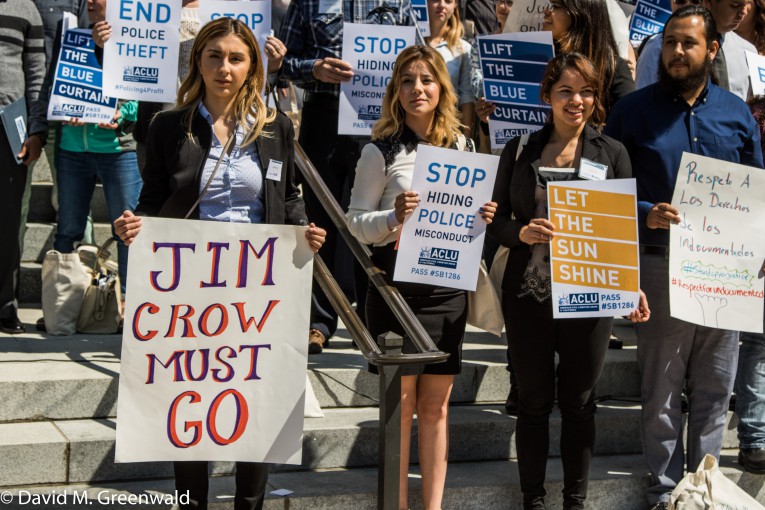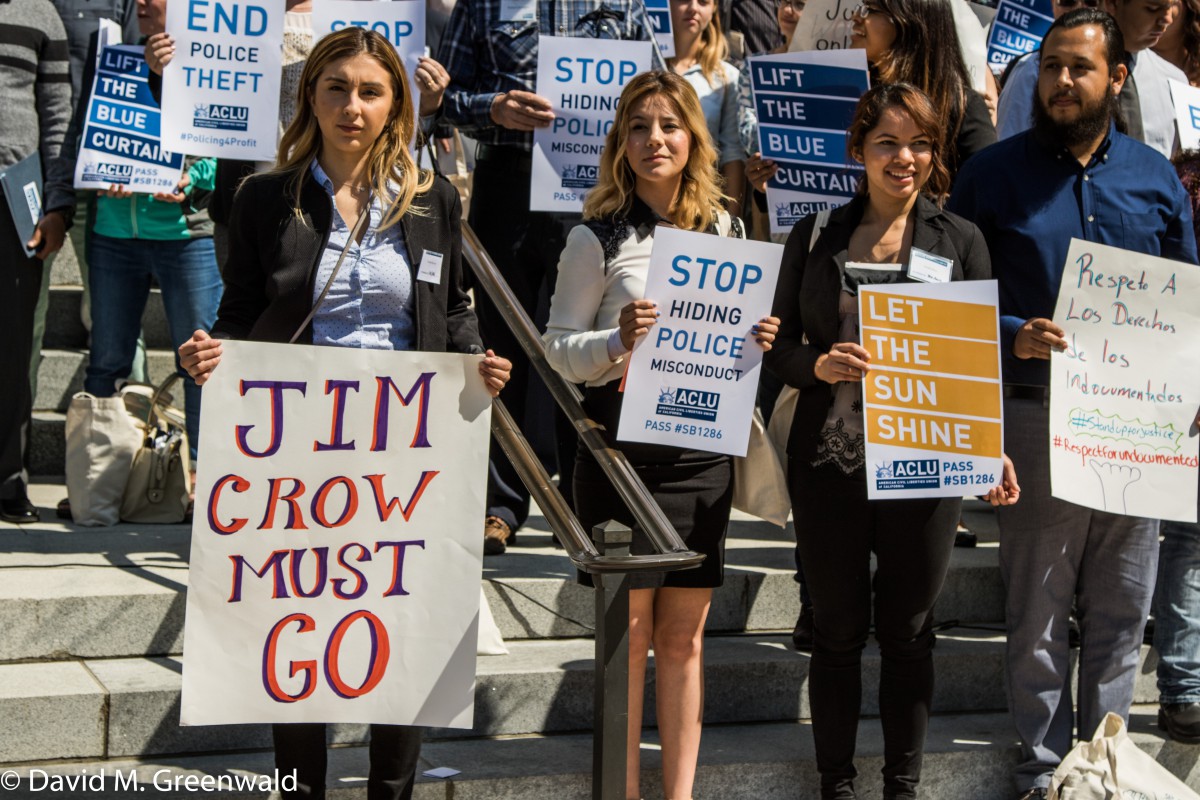

Bill to shine light on officer misconduct and serious use of force approved by the State Senate Public Safety Committee
The California State Senate’s Public Safety Committee on Tuesday voted 5-1 to advance SB 1286, legislation sponsored by Senator Mark Leno, to give the public access to crucial information about how police departments handle the most serious uses of force and confirmed instances of officer misconduct.
“SB 1286 attempts to rebuild trust between law enforcement and the communities they serve by providing greater transparency and accountability when misconduct is confirmed or use of force is applied,” said Senator Leno. “Our goal is to protect public safety, create safer communities and reduce law enforcement’s use of force.”
“We are thrilled to know that California is one step closer to living up to two cornerstones of democracy: transparency and accountability. Thousands of Californians have voiced support for SB 1286 and polls show the public – 79 percent of California voters – thinks more must be done to hold police accountable,” said Peter Bibring, Director of Police Practices for the ACLU of California.
All records related to the discipline of police, in contrast to those of other public employees, are absolutely confidential and exempt from California’s Public Records Act. As a result, departments are legally banned from disclosing to the public whether an officer is guilty of misconduct, if said officer was disciplined, or what the discipline consisted of – even if a department or police chief wanted to share that information.
“This bill would give families who have lost loved ones to police violence the information they need to gain closure and begin healing, something families are currently denied in California. All we want to know is what any grieving family member would want to know: what happened?” said Kim McGill, an organizer with the Youth Justice Coalition.
In the aftermath of countless high-profile officer-involved shootings of unarmed people of color, and as law enforcement agencies throughout the country and state struggle to repair fractured relationships with communities, California forbids law enforcement agencies from even sharing the factual findings in investigations of police shootings.
“This is a great day for any Californian who wants to better understand how police agencies investigate and resolve allegations of police misconduct. This is the first step in restoring people’s faith in the officers that put their lives on the line for us every day,” said the general counsel of the California Newspaper Publishers Association.
SB 1286 would restore police transparency in California by shining light on how police departments handle investigations into officer misconduct and serious uses of force. As indicated, unlike for other public employees, all records related to police discipline are completely confidential and exempt from California’s Public Records Act. As a result, departments cannot disclose when an officer is guilty of misconduct, if corrective action was taken, or what the corrective action was.
“California is behind the times when it comes to providing transparency in law enforcement records,” said Senator Leno in a February press release. “The public has a right to know when officers apply deadly force and when serious cases of misconduct have been confirmed. Failing to disclose such important information can fuel mistrust within our communities and threaten public safety.”
California law keeps records of officer misconduct and critical investigations secret:
- Sections 832.7 and 832.8 of the Penal Code, part of the so-called Pitchess statutes, make all records relating to police discipline confidential and exempt from disclosure under the Public Records Act.
- Courts have interpreted these provisions broadly to bar disclosure of records that could be used to assess discipline, including incident reports, internal investigations, civilian complaints, and other records related to uses of force or investigations into misconduct. This deprives the public of basic information on how law enforcement policies are really applied in critical incidents like shootings.
- Although California law requires that police agencies notify civilians who file complaints about the disposition of those complaints, agencies generally withhold the investigation report, any specific findings made, and any information about retraining, discipline imposed, or other corrective action.
The legislation was part of a rally that turned out nearly 200 people on Monday morning at the Capitol steps.

Brandy Brown, a member of the Youth Justice Coalition, a youth-led organization co-sponsoring SB 1286, urged the bill’s passing. Ms. Brown told the emotional story of the shooting of Ezell Ford.
She had been friends with Mr. Ford, an unarmed Black man who was shot and killed by Los Angeles Police Department (LAPD) officers in 2014. On the day Mr. Ford was killed, both Ms. Brown’s then one-year-old daughter and her four-year-old nephew were outside on the balcony and saw the police shooting of Ezell Ford not far from where they were playing.
“Senate Bill 1286 is important because we need to know the background of the people who are patrolling our neighborhoods,” said Ms. Brown. “We must pass the bill, because we are fighting for a day when we as young people of color will not be feared, hated, stopped and cuffed, locked up, locked down and locked out. We are fighting for a day when California will not lead the nation in police shootings, for a day when ‘to protect and serve’ doesn’t mean to protect property and serve the rich.”
Supporters of the bill, including Sacramento’s Black Lives Matter chapter, agreed.

“I support SB 1286 because our law enforcement agencies need to aggressively make an effort to regain the trust of communities of color. A huge step toward this is restoring transparency into police misconduct and use of force investigations. Because without transparency, police will never be fully accountable to the communities they serve. And without accountability, there is not trust,” said Tanya Faison, founder of Black Lives Matter Sacramento.
“California is among a minority of states that makes police disciplinary records confidential,” said San Francisco District Attorney George Gascón in a February statement. “If the public can’t determine whether an officer has been disciplined they can’t assess if accountability mechanisms are working. This contributes to the feeling that police departments are hiding something – even if they’re not – which ultimately adds to the mistrust between police and the communities they serve. This dynamic has a detrimental effect on our public safety.”
“Citizens frequently entrust their lives to police officers. In return, we ask for transparency,” said San Francisco Public Defender Jeff Adachi. “Senator Leno’s proposed legislation will allow public access to information regarding officers who have been found to use excessive force and other misconduct. This bill provides potentially life-saving information to citizens while boosting accountability for police departments. In San Francisco, officers with serious misconduct records that should have disqualified them from duty have gone on to harm city residents. Sen. Leno’s bill will help prevent future tragedies.”
—David M. Greenwald reporting

It will be interesting to see if times really changed, I remember after Copley in 2008, a similar bill got to the Assembly Public Safety Commission before the police unions showed up and killed it quickly.